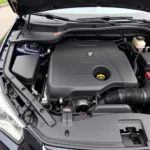OBD2 applications have revolutionized the way we interact with our vehicles. No longer are we limited to the dashboard warning lights and the cryptic messages they convey. With OBD2 applications and a compatible scanner, you can unlock a treasure trove of information about your car’s health, performance, and even your driving habits.
Understanding OBD2 Applications: A Deeper Dive
OBD2, which stands for On-Board Diagnostics, is a standardized system that allows external devices to access your vehicle’s computer and retrieve diagnostic information. OBD2 applications are software programs designed to interface with this system, providing you with a user-friendly way to interpret the data.
What Can You Do with OBD2 Applications?
The possibilities are vast and constantly evolving as technology advances. Here are some of the most common and valuable uses of OBD2 applications:
- Diagnose Engine Problems: Identify the root cause of those pesky check engine lights and other warning indicators. OBD2 applications can read and display diagnostic trouble codes (DTCs) stored in your vehicle’s computer, providing valuable clues to potential issues.
- Monitor Real-time Vehicle Data: Ever wondered about your car’s real-time performance? OBD2 applications can display a live stream of data, including engine RPM, coolant temperature, speed, fuel efficiency, and much more, allowing you to keep a close eye on your vehicle’s vital signs.
- Analyze Driving Behavior: Some advanced OBD2 applications can track your driving habits, offering insights into your acceleration, braking, and cornering patterns. This data can be valuable for improving fuel efficiency, identifying areas for safer driving, and even coaching new drivers.
- Customize Your Car’s Settings: Certain vehicle manufacturers allow access to specific settings through OBD2 applications. This can include adjustments for lighting, door locking preferences, and even performance tuning in some cases.
Choosing the Right OBD2 Application for Your Needs
The world of OBD2 applications is vast and diverse, with options ranging from simple code readers to comprehensive diagnostic suites. Consider the following factors when selecting an application:
- Compatibility: Ensure the application is compatible with your vehicle’s make, model, and year. Some applications may specialize in certain brands or models, offering more in-depth data and features.
- Features: Determine the specific features that are essential for your needs. Are you primarily interested in basic diagnostics, or do you require advanced features like real-time data monitoring and performance logging?
- User Interface: A user-friendly interface is crucial for an enjoyable and productive experience. Look for applications with intuitive layouts, clear data visualization, and helpful explanations.
- Cost: OBD2 applications are available at a wide range of price points, from free basic versions to paid subscriptions with advanced functionality. Assess your budget and the features offered to determine the best value.
The Future of OBD2 Applications: Connected Cars and Beyond
As vehicles become increasingly connected, OBD2 applications are poised to play an even more significant role in the automotive ecosystem. Here are some potential future developments:
- Predictive Maintenance: Imagine an application that analyzes your car’s data and alerts you to potential problems before they arise. Advanced algorithms and machine learning could enable predictive maintenance, saving you time and money on costly repairs.
- Integration with Smart Homes and Cities: Connected car technology could integrate with smart homes and cities, allowing your vehicle to communicate with traffic systems, parking garages, and even your home’s thermostat.
- Enhanced Security Features: OBD2 applications could enhance vehicle security by providing remote monitoring capabilities, theft alerts, and even immobilization features in the event of unauthorized access.
Conclusion: Empowering Car Owners Through Technology
OBD2 applications have empowered car owners with unprecedented access to information and control over their vehicles. By bridging the communication gap between car and driver, these applications offer a glimpse into the inner workings of our vehicles, enabling us to make informed decisions about maintenance, performance, and safety. As technology advances, the potential for OBD2 applications is limitless, promising a future of even more intelligent, connected, and driver-centric vehicles.
Frequently Asked Questions about OBD2 Applications
1. Do I need an OBD2 scanner to use an OBD2 application?
Yes, you will need a compatible OBD2 scanner to connect your smartphone or tablet to your vehicle’s OBD2 port.
2. Are OBD2 applications compatible with all car models?
Most modern cars manufactured after 1996 are equipped with the OBD2 system. However, it’s essential to check the specific compatibility of the application with your vehicle’s make, model, and year.
3. Can OBD2 applications drain my car’s battery?
Most OBD2 applications are designed to consume minimal power from your vehicle’s battery. However, it’s a good practice to avoid leaving the application connected for extended periods when the engine is off.
4. Are OBD2 applications legal to use?
Using OBD2 applications for diagnostic and monitoring purposes is generally legal. However, modifying vehicle emissions systems or exceeding speed limits based on information obtained from these applications may have legal ramifications.
5. Can I use an OBD2 application to program a new key fob?
Some advanced OBD2 applications and scanners, often used by professional mechanics, may offer key fob programming capabilities. However, this functionality is typically not available in consumer-grade applications.
Need Help Choosing the Right OBD2 Solution?
Choosing the right OBD2 scanner and application can be overwhelming with so many options available. If you need assistance selecting the best tools for your needs, our team at OBDFree is here to help.
Contact us via WhatsApp: +1(641)206-8880 or Email: [email protected]. Our 24/7 customer support team is standing by to answer your questions and guide you towards the perfect OBD2 solution. You can also learn more about specific types of OBD2 scanners, like the police OBD2 scanners used by law enforcement or the D5 OBD2 interface. We also have detailed information on the OBD2 J2534 standard and how to choose the right Bluetooth ELM327 OBD2 scanner for your needs. If you’re looking for an Ethernet to OBD2 adapter, we’ve got you covered there too.
